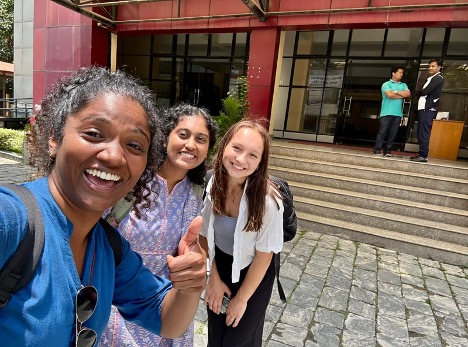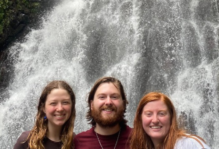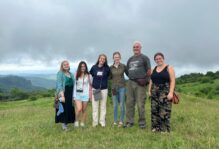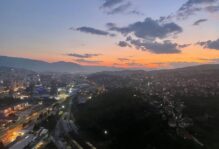Hydropower Diplomacy and Breaking Cultural Boundaries: My Summer Working on the Nepal Water Initiative
By Sarah Wozniak ’24
The Global Research Institute’s Summer Fellows Program provides international experiential learning opportunities to W&M students. This post is one installment of a series highlighting the 2023 Fellows’ key discoveries and formative experiences.
Stepping out of the bustling Kathmandu airport past the great Buddha statue which greeted my arrival, I gazed at the impressive mountain landscape, bombarded with beeping taxis and excitedly embracing Nepali families. I took a deep breath, gripping my luggage in both hands. Traveling to Nepal was my first time outside of the US, and I was eager to learn and take it all in.
I spent the summer in Kathmandu, Nepal as a GRI Summer Fellow working alongside Dr. Nara Sritharan and fellow Kritika Jotishankar on the Nepal Water Initiative — a large, multidisciplinary collaboration between AidData, the Institute for Integrative Conservation, and the Virginia Institute of Marine Science. The Initiative focuses on hydropower dam development in Nepal, analyzing its geopolitical implications, effects on biodiversity, impacts on individuals and their communities, and religious connections. Our trio’s main focus was to conduct in-depth interviews about the geopolitics surrounding hydropower dam development, with an emphasis on trends in foreign investment.
We engaged with experts in Nepali government ministries, the private sector, and nonprofits in Kathmandu, and we even made the trip to the Kulekhani reservoir, the largest hydropower dam in Nepal. In our conversations, activists were concerned about politics at the individual level, hydropower company owners focused on Nepal’s finances and investment decisions, and journalists discussed India, China, and Nepal’s political relations. These conversations were incredibly rewarding, and Professor Sritharan, Kritika and I would talk for hours over dinner about fitting each story together like the pieces of a puzzle.
After completing our interviews, we condensed the findings into three main points. First Nepal’s political instability and red tape are making investment in hydropower less attractive for foreign actors. Second, Nepal must leverage its position as a landlocked country between India and China, and avoid dependence on India for energy and exports. Third, Nepal must industrialize and develop sectors in its economy to consume hydropower domestically. Hydropower is booming in Nepal, but the Himalayan country must consider these options to maximize its natural resource potential.

Sarah, Kritika and Dr. Sritharan celebrating after our final interview in Nepal.
While our interviews opened my eyes to dozens of new perspectives on hydropower investment in Nepal, the most rewarding and educational moments of my trip were ordinary, day–to–day connections with people whom I met along the way.

Inna, Sarah and Kritika in Bhaktapur, Nepal for a family day trip.
Kritika and I stayed with a host family, who welcomed us with open arms. Moon Moon, Binayak, and their two young daughters, Inna and Ayana, became a second family to me when I was surrounded by unfamiliarity. From introducing us to the local Nepali cuisine of delicious dal and curry, teaching us Nepali nursery rhymes, making me homemade medicine when I got food poisoning (too many times than I would like to admit), and connecting us with tour guides and hotel deals, the Malla family completed my experience in Nepal with continuous kindness that led to relationships that will last a lifetime. I deepened my cultural understanding everyday by attending family events like a baby shower, dancing to Bollywood songs with Inna and Ayana and learning a little bit of Nepali everyday, despite learning at the same basic level as one-year-old Ayana.
In-between family time and interviews, Kritika and I were on the move. We both had the mindset of maximizing our time in Nepal, and it’s safe to say that we fulfilled that objective.
The first weekend of our fellowship, we flew to Pokhara, a lakeside city in Nepal, to trek. Our original goal was Mount Everest, but we eventually realized that was a bit too ambitious and settled with a two–day trek instead. Trekking with our guide Binod, a family friend of the Mallas, was incredible because we got to see rural Nepal, where villages live peacefully and simply amongst breathtaking views of the Himalayas. It was a sharp contrast from the chaotic, polluted streets of Kathmandu. Watching the sunrise alongside Bart, a stray mountain dog, gave me chills from the surreal peace and beauty.
The next few weekends, we went canoeing with alligators at Chitwan National Park, saw a monkey do a backflip at the Monkey Temple in Kathmandu, and even went bungee jumping at The Last Resort. I also went canyoning down large waterfalls, which was both challenging physically and mentally, and ended with a few leech bites in the process.

Photo I took looking out at Kathmandu from the top of Swoyambhu (the Monkey Temple).
I lived a radically different life for the seven weeks I stayed in Kathmandu. Even day-to-day events, like riding a motorbike home from work, and learning to eat with my hands was fascinating to me, because it was a window into another culture that I knew close to nothing about before this research opportunity. I now understand how I adapt to new and unfamiliar circumstances and realize the full value of doing research in-country that I could not begin to comprehend in Williamsburg. The ability to engage with policy officials, journalists and activists face–to–face has left me with a holistic understanding of hydropower in Nepal and an eagerness to travel back to learn more.
Now that I am back in the US, I am reviewing and compiling our findings into an article and a policy brief, with the hope that one day our ideas and collaboration with Nepali experts will help spur policy change and have an impact far beyond my own personal growth in Nepal.




No comments.